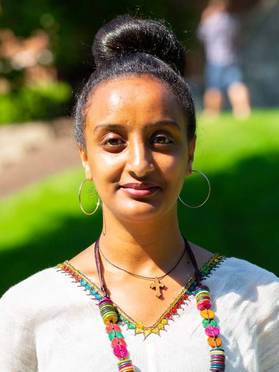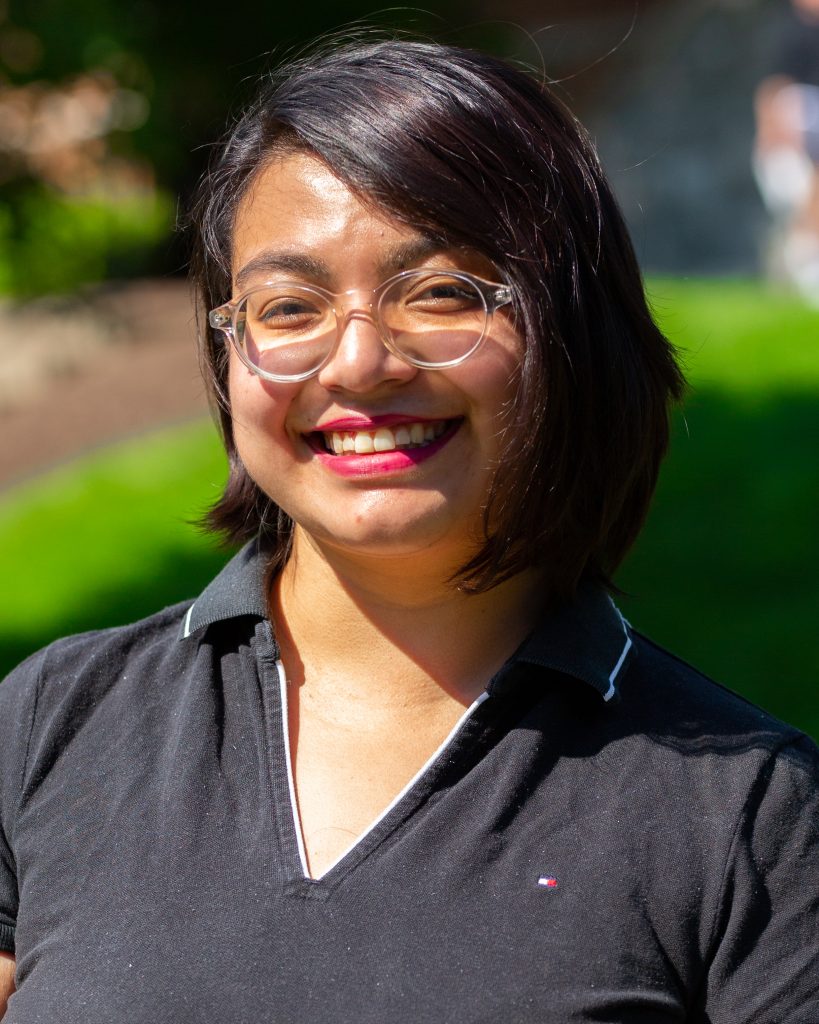While the COVID pandemic caused many challenges for EMU’s Summer Peacebuilding Institute, one benefit from going to virtual programming in 2020 and 2021 was a surplus in scholarship funds.
With no travel expenses to cover for those two years of virtual programming, that meant more funding to award for the 2022 sessions, back to the in-person format on the EMU campus.
Approximately 126 students participated in the four sessions over May and June. Six of those participants were Winston Fellows.
The Winston Fellows are experienced practitioners of international or indigenous backgrounds who were nominated by their organizations for the opportunity to deepen their understanding of theory and practice. They must work in the fields of peacebuilding, conflict transformation, restorative and transitional justice, sustainable development, humanitarian aid, trauma healing, monitoring and evaluation, and many other related issue areas.
“We usually award two fellowships, but excess funds meant we could significantly expand the number of recipients,” said Lindsay Martin, advancement director for the Center for Justice and Peacebuilding, the organization that hosts SPI. “We were so pleased to be able to expand the 2022 class. Since the start of SPI, our Winston Fellows have always contributed a high level of experience and expertise to our learning community. The knowledge, skills and connections formed during their time together at SPI will have a significant impact in their respective organizations and communities.”

The Winston Fellows included Karla Eugenia Nolasco Ayala, of Toluca, Mexico; Eyerusalem Gebremeskel, of Ethiopia; Kristine Marie Hill, of the Tuscarora nation, Haudenosaunee Confederacy; David Malual, of South Sudan; Iván Navarro, of Madrid, Spain; and Elad Vazana, of Israel.
Navarro, a native of Chile, said SPI’s unique learning space of multicultural encounter, “intercultural exchange, joint reflection and collaborative learning sets it apart from other learning programs. He was excited to take learnings back to his own work in community-building.
Two fellows work for Catholic Relief Services. Gebremeskel, a peacebuilding officer in the Ethiopian Country Program, called her experience “delightful and unforgettable.” She plans to continue in the MA in restorative justice program.

“My courses taught me how to define, explain, and interpret peacebuilding in various contexts. One aspect of my job is to facilitate peacebuilding trainings, and I learned how to do so effectively in the courses,” Gebremeskel said. “I’ve learned about various liberating structures such as the Troika consultation and sociometer that I’ll use in my personal and professional life. Furthermore, I was able to experience the diversified yet inclusive environment for participants from all parts of the world. I made friendships, met highly respected professionals and very knowledgeable instructors.”
Malual, also with Catholic Relief Services in rural South Sudan, emerged with more inspiration and hope. He works with women, children and the elderly who are often trapped in gun clashes.
“SPI brought a dynamic and resilient team of professionals from all around the world,” Malual said. “I was so fortunate to have met and interacted with men and women who cherish and work for peace to make the world a better place to live in.”
He also plans to continue his studies in the MA in conflict transformation program.
More on the 2022 Winston Fellows

Karla Eugenia Nolasco Ayala, of Toluca, Mexico, is studying alternative means of dispute resolution and collaborating in a private consultancy on restorative practices. She looks forward to working in non-profit organizations to fight for women’s rights, especially gender-based violence, as well as promoting social reintegration. “I consider myself a feminist and am passionate about peace studies, sustainable development, and the role of people, especially youth, in transforming communities,” she says. “For the last two years, I have become an advocate of sustainable development and restorative practices in my community, mostly in my university’s main campus.”
Eyerusalem Gebremeskel, a peacebuilding officer with Catholic Relief Services, has taken part in five peacebuilding and protection projects funded by Irish Aid, the United Nations Office for the Coordination of Humanitarian Affairs, and the European Union. She has reached more than 145 women peace group members through peacebuilding trainings and more than 1,000 youths through Youth Peace Ambassador training. In parts of Ethiopia where conflict and civil war has occurred, she has been active in the establishment and construction of connector projects, the establishment of school peace clubs, and the provision of livelihood support for unemployed youths. She also has collaborated with CRS’s protection team to provide protection training and has contributed to some reporting mechanisms of the emergency unit. Previously, Gebremeskel interned on the Girls Gain project, working to improve the education of young girls living around Meki, Ethiopia. In the future, she hopes to reach more youths in peacebuilding initiatives and collaborate with them to lessen unemployment and encourage entrepreneurship.
Kristine Marie Hill is a member of the Beaver Clan, Tuscarora nation, Haudenosaunee Confederacy. She has been practicing indigenous peacekeeping for over 25 years within the educational and familial systems of her home community on the Tuscarora reservation, serving the next generation’s reacquisition of their language, traditions, and ceremonies. She is the proud mother of four adult children and six grandchildren, several of whom are speaking the Tuscarora language that her grandmother was forced to forget in the Carlisle boarding school.
Hill has spent 20 years working in K-12 education systems as an educator, an accountant and auditor. Since 2020, she has followed openings to share practices of peacekeeping beyond her home community and into the larger historical waterways of the Haudenosaunee and beyond. To enable the wisdom that can nurture renewed and even healthy relationships across cultures and support the growth of harmonious movements, she is launching Collective Wisdoms, LLC. Using what she describes as the Succotash Way, her work is built on corn (the sustainers), beans (institutions in need of support), and squash (wanderers and responses to invitation).

David Malual works for Catholic Relief Services as a social cohesion program manager for the USAID- funded Resilience and Food Security Program in South Sudan. He has also worked with CRS in project management, peacebuilding and conflict prevention, social cohesion and psychosocial support. Malual has attended the CRS training for spokespersons. He has attended and also facilitated CRS workshops on peacebuilding and conflict analysis.
He holds a master’s degree in vocational pedagogy and economics from Oslo Metropolitan University, Oslo, Norway,; a first degree in education from Ndejje University, Uganda; and an award from Ghent University, Belgium.
Iván Navarro is a lawyer and native of Chile living in Madrid, Spain.. He is experienced in the justice sector´s public policies and restorative justice for juveniles. He is a PhD candidate at the Universidad Carlos III in Spain.

Elad Vazana, of Israel, is an educator, multi-narrative tour guide, an artist and experienced mediator and facilitator of successful face-to-face relationship building for social change for the past 20 years. He works with Tour For Change. “I help people with diverse backgrounds from all over the world to build trust while experiencing that ‘an enemy is one whose story we have not heard,’ he says.
Vazana has facilitated dialogues and exchanges with Palestinian and Israeli youth and adults, including Muslims, Christians, Jews and other groups.
